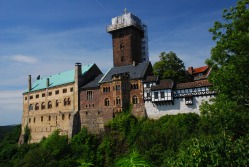 I'd wanted to visit Eisenach for a while, but never found the time until my last week in Germany - and didn't manage to find enough time to post it until this week. Eisenach and Marburg share a number of connections - they were even sister cities when Germany was divided into East and West. They both have nice old castles on hills (and both were residential palaces, not defensive fortifications) and they both have a connection to Luther. Eisenach was were Luther translated the Bible into German, creating Modern High German (what they speak over there nowadays) in the process) and Marburg hosted the Marburg Colloquy (our connection is far more tenuous, but we're still proud of it). They both have a university (Marburg wins this battle), and their old towns are covered in half-timbered houses. Even the original Hessian (the state that Marburg is in) royalty were originally Thuringian (the state that Eisenach is in). Most of these similarities are superficial, and once you start to look into the history of the towns they start to diverge rather quickly. After the High Middle Ages/Early Renaissance, both cities went into a decline, and while Marburg became a relative backwater, Eisenach maintained prominence, especially when the Prussians (good Lutherans all!) started to unify Germany. Luther's "spiritual unification" of Germany (just don't tell the Catholics in the South...) became a major Prussian selling point, and they jumped on the Wartburg (Eisenach's castle) as a symbol of unification.
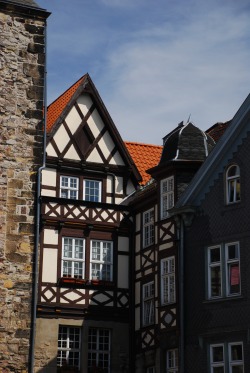 The symbolism of the Wartburg was then put to more nefarious (to the Prussians at least) means during the early German democratic movement. A number of students and professors (among them the Brother's Grimm, who had studied in Marburg...) occupied the castle, proclaimed a new German Democratic Republic (not to be confused with the one that came later...) and for good measure, invented a new flag - the modern German tricolor. The Prussians were less than pleased, and promptly removed the offenders, but it was a major incident on Germany's long path to democracy.
Getting to the castle followed a similar route to what the students must have done - from the train station it's about a two mile walk (mostly uphill) through the old town, the suburbs, and the German version of wilderness (including a Bratwurst stand at the end of the path) to the Wartburg. It was quite popular when my tandem partner and I went, but we managed to escape by latching onto a guided tour (fairly standard as far as castles go). From the Wartburg it was back into town, where we regained our strength at one of the cheap (yay for the former East Germany!) beer gardens, walked through the old city, saw the house where Bach was born, and jumped on the train back to Marburg. Not bad for a day trip.
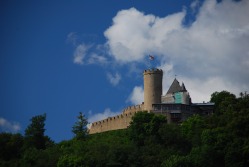 After getting back from a nice 10-day trip through Germany (pictures here), I decided to explore more of the area around Marburg for my final week in Germany. After a somewhat faltering attempt yesterday (lost in the woods somewhere in the backwoods of Marburg trying to find a castle ruin), I set out for an easier goal - the city of Biedenkopf. It had the advantage of being a short train ride away (no chance of getting lost!) and it's been on my list for awhile, although the cold winter months forced me to put most of my list on hold. At first glance, the city itself is fairly typical for Central Hessen - there's a hill with a castle on it, a river, lots of half-timbered houses, and a few small churches - nothing too remarkable. However, the castle museum (technically one for the whole town, but when the town and castle are as small as they are...) had a few nice surprises, including an antique fire truck (with a hand-powered hose) and the last post carriage used in Hessen. Biedenkopf was also one of the few towns to survive WWII unhurt (there are advantages to being small!), so the castle and the half-timbered houses were in a nice state of authentic disrepair. Biedenkopf's history also ties in well with that of Marburg's - the founder of Hessen, Sophie of Brabant, ordered that castles be built in both towns to provide defense against the Archbishop of Mainz, and Biedenkopf was one of the few times that was part of Hesse-Marburg for its (very) brief existence. In addition to the history noise, Biedenkopf has one other very important feature - after Oktoberfest, its city festival features the most consumption of beer per capita in Germany. Not bad for Central Hessen.
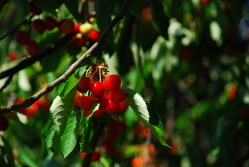 Germany is full of nice little surprises - like a surprising overabundance of (what I hope are) public cherry trees. Located mostly near train tracks and busy intersections, these trees usually drop all of their fruit before someone harvests it - so it's a good thing that I'm there to remedy this problem. The cherries are an odd cross between "wild" (read: not delicious) and cultivated (read: amazingly delicious, but at 4 Euro a kg, too expensive), so while they're not gourmet, they are cheap - and the extra sour flavor is just a bonus for me. All in all, not a bad way to score the occasional free snack.
As an added bonus, here's a video of the fireworks in Marburg (yes, the soundtrack is Star Wars as played by the university orchestra), courtesy of Tour de Flener.
Marburg held (one) of their annual city festivals this weekend, and it wasn't quite what I expected. Normally, Marburg is a nice, quiet, reserved town (with some students to make life interesting of course) in the middle of the German equivalent of Kansas. We don't even get the high speed trains. However, for the festival (hereafter 3TM - Drei Tage Marburg) the town transformed itself. Most of the walkable sidewalks in the old city were converted into a market (stands selling Wurst, beer, and kitsch - the usual), and the town somehow managed to find space for no less than nine open-air stages, with a very nice mix of music (oompah bands to Latin jazz fusion/reggae). For me, the highlight was the conversion of the castle park (where the defenses used to be, now a rarely visited park) into a sort of mini-festival ground. With no less than 4 stages, 6 beer tents, various fried food stands, and an exhibit about math/geometry within a 2km radius, it made for some pretty nice and eclectic wandering. Where else can you build a small bridge without any glue (yay friction!), order a half liter of Hefeweizen, and stroll between a jazz quartet and a German rock/pop band?
Sadly, the weather did not cooperate as much as I would have liked - although the fest lasted from Friday to Sunday, Sunday was mostly rained out (which helped keep me inside and grading papers), so I only got to experience the fest for one day. I also didn't get to go on Friday, as Erica left for the US on Saturday so we had a nice going-away party for her in Mainz. Continuing my theme from last week, that marks my last visit to Mainz (my second home in Germany), and since Erica has left I'm now forced to realize that yes, my time in Germany will come to an end soon as well.
However, had I made it to the fest on Friday, I could have experienced that rarest of all occurrences - free beer (and given to me by the mayor, no less!). It's one of Marburg's fun traditions that for the start of the fest they bring a keg of beer to the Marktplatz and tap it at 11 AM (too early for me) while dressed in traditional clothing. Since I missed this event, it looks like I'll just have to find a way to come back next year...
Now that my in Marburg is coming slowly to an end, I'm starting to do things for the last time. These final experiences are helping to drive home what I've done in Marburg and help to show me how fond I've become of this city (it really does feel like home now). Yesterday I had two of these final experiences: volunteering at the retirement home and my last Aikido training session. Volunteering at the retirement was sort of like "Tuesdays with a Racist Eastern European Murray", but I'm glad that I was able to give him someone to talk to (read: at) for a few hours a week, as the rest of the residents were not able to carry out a complete converstation.
Aikido is another activity that I will miss - although it's a martial art, it's not very violent and focuses more on practical techniques and defeating your opponent (not that I ever expect to use it in a fight...) as painlessly as possible. The intructor was quite friendly, as were the others who took the course, and I plan to continue when I start at the University of Michigan in the fall. More than the class itself, I'll miss the walk back from the gym to my room - it's late enough that there's almost no other pedestrians and I can enjoy the old city at night. It's also nice to walk around on a summer night without having to worry about personal safety, so this is another small habit that I will have to adjust when I get back to the US. It's these little routines that I've gotten into which have helped Marburg feel more like home to me, so giving them up is a gentle reminder that it's time to head back and starting looking towards the future.
We were quite sad that we would not be able to celebrate the Fourth of July (no fireworks?), but Germany decided to accommodate us in a big way - "Rhine in Flames" (it just sounds odd in English, I know) happened on the fourth of July, and it was one of the greatest spectacles (in the best sense of the word) that I've yet experienced. When it started, we found ourselves on an Autobahn pull-out that was almost perched over the Rhine across from two ruined castles and facing down the fleet of around sixty large and fully decorated ships (we would have been on one, but at 60+ Euro per ticket...). When the fireworks started, it was still dusk - so we got to watch the fireworks explode against the setting sun over moodily lit (since Germans don't shy from the Gothic, all of the castles and churches were lit with torches and blood-red spotlights) castle ruins. Sadly, we could only see the first part of the fireworks from here, so it was off to the next stop after the first 30-minute show.
We watched the last half of the fireworks from the Niederwalddenkmal - a relic of Germany's Imperial past, and a sweeping monument of a half-naked Germania brandishing a sword in victory at the defeated French from the cliffs near Rudesheim. Sadly, we were not the only ones with this idea, so to get a clear view we were "forced" to climb onto the monument itself and watch from there. After setting off three more sets from more ruined castles/monasteries/what have you, a barge made its way into the middle of the Rhine and let loose with a world-ending cataclysm of red, white, blue, and green (almost our flag...) fire. Since the Rhine makes its way through a mini-canyon, we then felt the vibrations for another good minute or so, and the show came to a close.
The next morning (after sleeping in for a bit), Erica and I took a walk around town and enjoyed my last weekend in Mainz (it's very odd to think that I won't be back in the city again). I finally got around to seeing the Chagall windows in St. Stephan's church, which lived up to my (probably too high) expectations. I'm glad that it was my last experience of the city, as it will leave a lasting impression.
That's not the only thing we had on tap for the day though: as a birthday gift Erica's roommate gave me 10 Euro to spend in the Weisbaden Casino - the same casino which "inspired" Dostoevsky to write his novella "The Gambler" after winning some (and losing more) at the city's roulette tables. Roulette seems to be the only game that Wiesbaden really has, and those of you with an even elementary knowledge of statistics will not be surprised that I did not leave with anything. However, going to the casino was worth it just to look inside - Wiesbaden was never bombed during the war and the room remains almost exactly as it did in the 1850's - full of dark polished wood and burnished bronze. As a memorial to Dostoevsky, "his" roulette wheel stands in a corner. It was certainly a lot of experiences to pack into one weekend, but e
Astoundingly, today marks the start of the one-month countdown to leaving Germany. The last few months (since April in particular) have flown by - it seems like only yesterday that June had started, and we're already coming up on the first weekend in July. A lot of this relativistic(ish) passage of time has to do with the fact that I have a lot more on my plate than I had at the start of my Fulbright grant, and all of these responsibilities (I hate to call them that because I really enjoy most of them) keep my days full and help to pass the time. This weekend shows no signs of letting up: some other Americans and I are having a 3rd of July (no, that's not a typo) BBQ before heading down to watch fireworks over the ruined castles of the Rhine on July 4th. For the 5th Erica and I are going to the casino in Wiesbaden with her roommate (it's the first chance we've had to celebrate my birthday last month), and on Monday I have to start grading the final papers from my Academic Writing Course. If that weren't enough, there's an open-air movie in Marburg tonight, and since the chance to experience that happens so rarely... you get the idea.
However, the fact that I only have a month left has put me in a bit of reflective mood and helped me realize what I will miss about Germany - and (more interestingly for most of you) what I'll be glad to get away from.
Things I'll miss:
- The bakeries. I think that white bread will now make me cry (in pain).
- Being able to study for free.
- Beer gardens (self-explanatory).
- Schnitzel, Döner, Auflaufs, and Gelato. And who said that all German food was bad?
- A public transportation system that actually works.
- A generally (in comparison to the US) stress-free lifestyle.
- Being able to walk anywhere in Marburg at any time of night and not have to worry about personal safety.
- Compact, walkable cities.
Things I won't miss: - The endless beaurcratic nightmare that is trying to get anything official done.
- Germans' insistence on never forming an orderly line. For anything.
- Being glared at by old women for no apparent reason.
- The lack of air-conditioning.
- The inability to find a real (read: non-McDonald's) hamburger.
- Living in a dorm.
As you can see, the good outweighs the bad - and while I'm looking forward to coming home and starting at a new university, I've had a great experience here and I'll miss Marburg (and Germany) a lot. I have a feeling that I'll be coming back to Germany at least a few more times in the future.
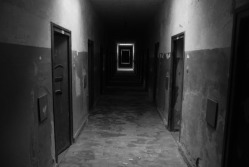 Munich is one of my favorite German cities, and every time I go back I'm reminded why - it's the only large city I've been to that feels small and friendly, and everywhere you look there's something new and different. The omnipresent beer gardens don't hurt either. We were in Munich over the weekend visiting family (making it my third visit this year), and we took the time to explore some of the areas that we hadn't been to before. Dachau was one of these places - it was one of the largest concentration camps on German soil and it's been kept in almost the same condition that it was in when the Americans liberated it. The museum in the complex is very moving and extremely detailed - we stayed for four hours and only left because it was closing - and covers almost every aspect of life in the camps and the repressive excesses of the Nazi regime. One of the most interesting and terrifying buildings is the "bunker", a sort of prison within a prison at the camp. Prisoners were kept in solitary confinement and darkness for up to two months, and oftentimes the only sound that they would hear was a gunshot at 2 AM - signifying the execution of a fellow prisoner. In an appropriately ironic twist, the German guards who ran the camp were held prisoner here by the American forces before their execution. The experience was one of the most moving that I've had in Germany.
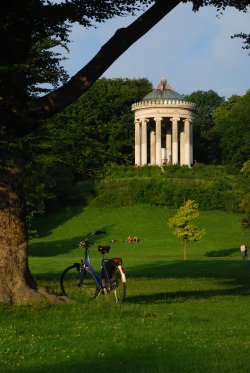 Despite the horrors of Dachau, we managed to enjoy one of Munich's greatest assets - the English Garden. It's essentially an enormous park in the middle of the city (larger than Central Park) which contains two artificial rivers, a lake complex, a faux-Greek temple, and, my personal favorite, a wooden Chinese pagoda. The pagoda is surrounded by an equally impressive beer garden (over 7,000 seats!) run by the Hofbrauhaus, the former Royal Brewery of Bavaria. Like most beer gardens, you can buy beer by the liter. I can report, after much scientific study, that it is delicious.
We only stayed in Munich for two days, and on the second day we decided to visit a museum. We had noticed that there was an exhibition about King Tut's tomb - and in our excitement we forgot to check the reviews of the exhibit. This mistake turned out to be fatal, as there were no original artifacts (for some reason Cairo didn't want to share), so all of the "artifacts" on display were (rather cheap) copies. Instead of precious stones, gold, and superior craftsmanship from a vanished culture, we saw painted wood. After this dissapointment we were out of time, so we were unable to visit the BMW museum or the Alte Pinakotek (the two main sights I wanted to see on this trip, ironically) - but there's always next time.
As always, the interested can view photos here.
While checking my email this morning, I noticed an urgent (not even kidding) message from AStA (a national student-government type thing. It's very odd) informing me that the occupation of one of the lecture buildings will continue. They invited all of us to take part in the events that they are hosting, like documentaries and discussion sessions (this is a Serious Protest). The occupiers have run into a bit of a snag - the building that they chose to occupy houses the library for political science, and the undergraduate thesis for political science students was supposed to be due on Monday. As a compromise, they've managed to extend the deadline for the thesis by three days - but as the occupation is continuing, this extension will not be a big help. Rest assured, they are "trying" [sic] to make the library available. Good to keep the priorities in order here - finshing your bachelor's thesis=bad, discussing documentaries and alternative workshops=good. Score one for the Bildungsstreik!
Continuing the hilarity, they've issued another list of demands, this one more riduculous than the last. High points include: "Removal of compulsory attendence from the entire social sciences" and the too-awesome-to-be-true "two-hour lunch break and class-free Wednesday afternoons to encourage collaboration and active participation in student committees." Again, please don't misunderstand me - I think that it's good that students are trying to take control of their education, but they're going about it in entirely the wrong way (potentially screwing your fellow students out of a degree is not the way to make friends) - and there's still not a compromise in sight.
For those of you who can read German, I've linked the original email here.
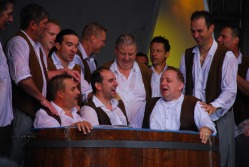 Johannisnacht is a relatively new festival - it's only been held since 1967 - but it reaches back to Mainz's history, especially that of its most famous son, Johannes Gutenberg. After the invention of the printing press, an entire industry sprang up around printing, complete with a printer's guild and the necessary apprentices. Upon completion of their training, the apprentices would be dunked in water in a ceremony known as "Gautschen", which was supposed to "ritualistic cleanse of the impurities they had commited during their time as apprentices" (it would seem that some things never change) - but was really just taken from the old custom of depostion. Once the apprentices had been dunked, they received a certificate confiming that they had gone through the process to ensure that they wouldn't have to repeat it. When the traditional methods of printing books started to fall by the wayside, the "Gautschen" went with it - until Johannisfest was started. The Gautschen serves as one of the festival's high points, and the organizers take great pains to make it seem "authentic" - from the man dressed in period costume reading the names off the list to the certificates given out to the dunkees at the end of the day. Interestingly, the term "apprentices" has adapted to the changing times and now includes those who complete an apprenticeship in any form of media - from newspapers to radio to television. In a gratuitously crowd-pleasing addition, any teacher found in the audience will be hauled up on stage and ceremoniously dunked in the bucket. This ceremony used to be one of many different events - but in 2005 they scrapped the jousting competition that they held in the middle of the Rhine. Other than these main events, the festivalis a fairly typical German city festival, sort of like what Oktoberfest used to be. One high point is the overly amazing used book fair - I could have spent way more time there looking through all that they had to offer - from antique maps showing Hannibal's march over the Alps to an 1850's printing of Plato's Phaedrus for Greek students to good, cheap copies of classic German novels. If the books got to be too much, you could recuperate with the dozens of wine stands and listen to cover bands playing classic rock (ZZ Top, Deep Purple, and a great Led Zepplin cover).
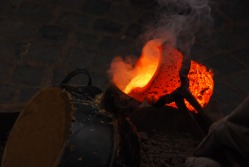 In addition to rides, food and drink stands, and stalls hawking a rather odd variety of wares (everything from old advertisement placards to African folk art) there was a surprising exhibition set up in front of the Gutenberg Museum - a delegation from a traditional printing workshop in South Korea set up an interactive display where you could make paper, use traditional printing methods to print Korean characters onto these pages, and then try your hand at traditional book-binding techniques to turn the finished product into a book. And if all that weren't enough, the craftsmen also held regular demonstrations where they would cast the printing blocks out of molten lead - I was amazed at how quickly they were able to produce new characters (it took about 15 minutes to make 8 new ones). It was a very interesting exhibit, and helped to ground the book-printing process somewhere in reality for me. It's all too easy to forget just how much work goes into printing a book and especially to lose touch with it's rich history and traditions - and reconnecting with that process is what Johannisfest (at least partly) is supposed to be about.
|








 RSS Feed
RSS Feed